Exploring the Flaws of Greek Gods: The Bedrock of Western Thought
Written on
Greek mythology stands as one of the most significant remnants of ancient times. Similar to the Bible, it has profoundly influenced later cultures and laid the groundwork for much of Western civilization. What insights do we have regarding these myths? Which deities were revered by the ancient Greeks? How do Greek and Roman mythologies differ? Below, I will address these questions and more.
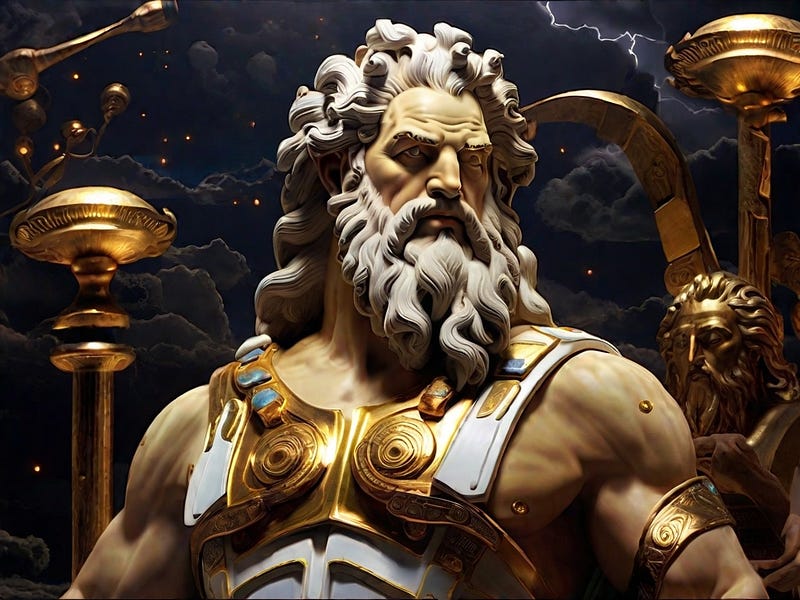
Throughout history, humans have sought explanations for phenomena that elude understanding. While science now clarifies many mysteries, ancient peoples often attributed the unexplainable to divine forces. This quest for comprehension birthed belief systems as civilizations emerged.
Each culture crafted its own pantheon of gods, frequently adding new deities alongside existing ones, each with distinct traits. Interwoven with the divine narratives were tales of ordinary individuals, reflecting the mindset of the ancient Greeks and the social dynamics of their time. Over the years, the religious significance of these stories diminished, yet they remain invaluable for understanding life in antiquity.
Characteristics of Greek Mythology
Greek mythology encompasses a rich tapestry of tales about the world's creation, divine beings, heroes, and their connections with humanity. Initially shared through oral traditions, these narratives later evolved into written forms.
The ancients derived their understanding of existence and its governing forces from these myths. They sought to grasp the world's origins and history through these stories, which also conveyed ethical and social norms outlining individual roles within society. While predominantly fictional, many myths were often intertwined with real historical events.
As a vital aspect of ancient Greek culture and religion, mythology was inherently polytheistic, showcasing a belief in numerous gods. Each aspect of nature was believed to have its own divine protector. However, unlike many ancient cultures, Greek religion lacked a strict orthodoxy. While there were common rituals, a significant degree of freedom existed in interpreting the tales of gods and heroes, and discussions and debates were common, largely due to Greece's fragmented political landscape.
In ancient times, Greece comprised independent city-states, each with its own deities and unique interpretations of them. This variety is evident in the myths, where multiple versions often diverge or contradict one another.
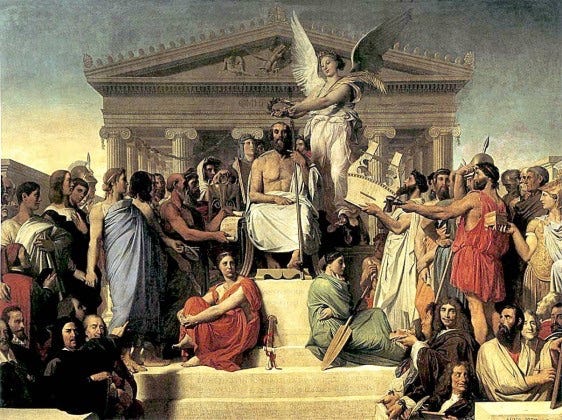
Gods of Greek Mythology
Unlike Norse mythology, where deities are portrayed as mortal, the Greeks viewed their gods as immortal and transcendent, albeit with human-like traits. The perception of these gods has evolved over time.
In the earliest tales, before humanity existed, gods were depicted as violent beings embroiled in power struggles. Following them were non-human creatures, including Cyclopes and Titans.
It was only with the rise of the Olympians that these deities became more relatable to humans. The Greeks worshipped anthropomorphic gods—eternal beings with immense power yet often flawed like humans. While they possessed supernatural abilities, they were also vulnerable to common human failings.
For a long period, Greek gods interacted closely with humans, descending to their world and forming intimate relationships. Tales often recount romantic entanglements between gods and mortals.
The Olympian gods wielded ultimate authority over humanity, determining their fates. Temples were erected in their honor, where they were venerated. While twelve Olympians are commonly recognized, various myths mention different names, highlighting the ambiguity of Greek mythology.
In various accounts, ten core gods are identified: Zeus, Hera, Poseidon, Hermes, Apollo, Hephaestus, Aphrodite, Athena, and Artemis. The identities of the remaining two deities vary, potentially including Hades, Hestia, Demeter, or Dionysus.
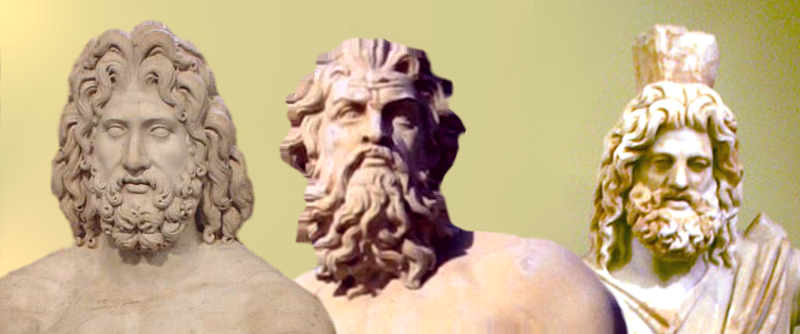
How Many Greek Myths Exist?
Initially transmitted orally, myths later took on literary forms. The foremost sources of knowledge about these myths include the works of Homer and Hesiod. In addition to the "Iliad," "Odyssey," "Homeric Hymns," and "Theogony," non-religious writings by Greek and Roman poets, such as Apollonius of Rhodes, Callimachus, Ovid, and Hyginus, also explore mythological themes.
Determining the exact number of myths is challenging today. Robert Graves' 1955 monograph describes 171 distinct narratives.
Key Greek Myths
Greek myths encompass a broad spectrum of themes, from the creation of the universe and the first gods to epic battles and the tales of various deities and heroes. Here are several notable myths.
The Myth of the Creation of the World
According to Greek tradition, the universe originated from Chaos. But what is Chaos? Some viewed it as a formless deity, while others saw it as a vast abyss brimming with creative potential. From this Chaos emerged two powerful beings: Uranus (the sky) and Gaea (the earth). Their union produced the Titans, Cyclopes, and Hecatonchires.
Uranus, frightened by these monstrous offspring, cast them into the depths of Tartarus. Gaea, angered by this, conspired with her youngest Titan, Cronus. Armed with a sickle, Cronus brutally mutilated his father, leading to the birth of the vengeful goddesses from Uranus's blood.
As the world formed alongside the gods, sunlight and rain nourished the earth, giving rise to forests and wildlife. Cronus ruled with his partner, Rhea, but was haunted by a curse that foretold his overthrow. To prevent this, he devoured each child Rhea bore, but thanks to her cunning, only Zeus survived. Eventually, he would challenge Cronus for power, confronting an entire generation of giants.

The Myth of Demeter and Persephone
This tale elucidates how the seasons were understood in ancient times. Demeter, the goddess of agriculture and fertility, wandered a meadow with her daughter Persephone, cautioning her against picking the narcissus flowers, sacred to the underworld gods. However, Persephone succumbed to the allure of the blooms.
Enchanted by their scent, she let her guard down, allowing Hades to abduct her to the underworld. Ultimately, Zeus commanded Hades to return Persephone to her mother. Yet, using cleverness, Hades ensured that Persephone would spend three months each year in the underworld. During her absence, winter enveloped the earth, and life ceased. When she reunited with Demeter, spring emerged, and their joyful time together heralded summer, while their parting brought forth the sorrowful rains of autumn.
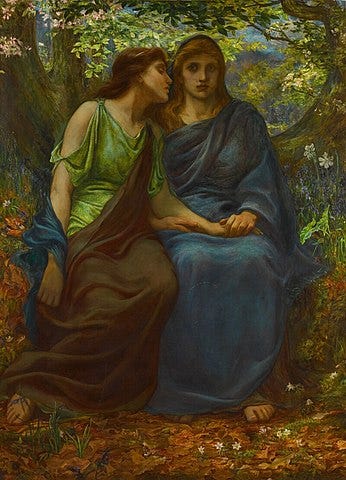
The Myth of Prometheus
Another significant myth recounts the creation of humanity and how suffering came to be. Prometheus, a Titan, is said to have fashioned the first human from clay mixed with his tears, breathing life into him with sparks taken from Helios' chariot. These beings resembled gods but were fragile and vulnerable. To aid their survival, Prometheus gifted them the fire that belonged to the gods.
Angered by this, Zeus commanded Hephaestus to create a woman resembling the divine goddesses. Thus, Pandora was born and sent to earth with a mysterious box, which, once opened, unleashed diseases, worries, and sorrows into the world.
In retaliation against Zeus, Prometheus sacrificed a bull, concealing the meat beneath the skin while hiding the bones and fat elsewhere. Zeus, deceived by the more appealing appearance, chose the latter. Upon realizing the trick, he punished Prometheus severely, chaining him to the Caucasus Mountains, where a ravenous vulture feasted on his ever-regenerating liver.
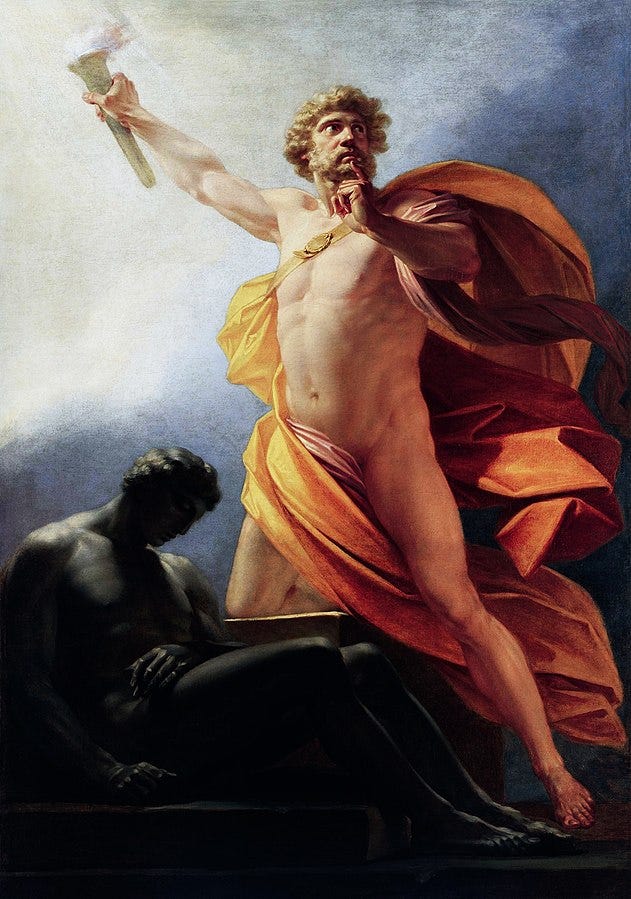
What Distinguishes Greek from Roman Mythology?
Roman mythology draws heavily from Greek myths but is not a straightforward imitation. Romans reinterpreted the deities, assigning them new names and often different traits. Unlike their Greek counterparts, Roman gods seldom interacted with humans or engaged in close relationships. Instead, they were typically more militaristic. Additionally, Roman mythology incorporates local legends unique to their culture, such as foundational and etiological myths.
Fascinating Insights into Greek Mythology
Having outlined the essential aspects of Greek mythology, here are some intriguing tidbits about Hellenic beliefs:
- The familiar symbol of pharmacy—a cup entwined by a serpent—originates from Greek mythology, representing Hygieia, the goddess of health.
- Pandora, the first woman, was sent by Zeus as a punishment for Prometheus's theft of fire from Olympus.
- Greek gods held immense power over humanity, yet they lacked control over fate and destiny.
- The Greeks did not idealize their deities; their stories often highlighted the gods' vulnerabilities, including jealousy, defeat, and desire.

